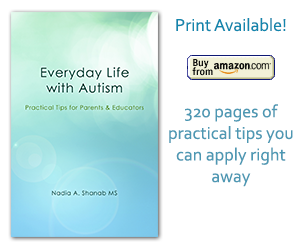By Nadia Shanab | Uncategorized
It is much easier to deal with sensory issues in younger children with ASD wether at home or in classrooms. Wearing headphones and typical weighted vest is much less tolerated in junior high or high school. How can you help your teenager with ASD? Tips 1- To relieve stress, replace the figity objects with stress
Tags: autism, communication, discipline, organization, parenting, senses, sensory, social interaction, techniques, tips
Posted in Uncategorized | Comments Off on Tips to Help Teens with Sensory Issues
By Nadia Shanab | Uncategorized
The Autism Research Group (ARG) in San Diego, California, is hosting an intense one-day workshop about “Effective Autism Behavior Intervention Techniques”. The workshop will be held in San Diego on April 29, 2013 at the Catamaran Resort and Spa from 9:00 am to 4:00 pm. The Center focuses on ABA (Applied Behavior Analysis) which is
Tags: autism, communication, discipline, flexibility, health, independence, occupational therapy, parenting, research, social interaction, techniques, tips, visual aids, workshop
Posted in Uncategorized | Comments Off on Teaching Perspective-Taking and Executive Function Skills
By Nadia Shanab | Uncategorized
Laughter is one of the most common and pleasant opportunities to socialize and connect with people. Laughing is interactive; it takes two or more people to share such a great social moment. Relationships can develop easily and naturally in such a relaxed context. We have agreed before that individuals with autism are just like anybody
Tags: autism, communication, flexibility, health, independence, laughter, occupational therapy, parenting, social interaction, speech
Posted in Uncategorized | Comments Off on The Laughter Therapy
By Nadia Shanab | Uncategorized
A very insightful article in the the British “Guardian” newspaper, what parents of children with autism think about a cure. Some parents are very realistic, others are in denial. How does the media participate in helping/discouraging parents. Cure? Therapy? What is the most important support, resources do parents need? Read what parents say here: www.guardian.co.uk/commentisfree/2013/mar/01/parents-children-autism-cure
Tags: asperger's syndrome, autism, communication, cure, legal rights, occupational therapy, parenting, placement, research, social interaction, speech, transition
Posted in Uncategorized | Comments Off on What Does “Cure” Means to Parents?
By Nadia Shanab | Uncategorized
New findings published in Pediatrics: “70 % of children with autism spectrum disorders (ASD) who have a history of severe language delay, achieved phrase or fluent speech by the age of eight.” There are 2 indicators to predict the quality and age of speech. 1- Nonverbal intelligence is the strongest predictor of phrase speech 2-
Tags: autism, communication, health, parenting, research, social interaction, speech, tips
Posted in Uncategorized | No Comments »
By Nadia Shanab | Uncategorized
For paraeducators who wish to learn more, here are the classes and workshops offered in this conference: members.csea.com/cseaMail/attmentuploads/cml_1212_1.pdf The 16th Annual Paraeducator Conference is coming up April 10-12, 2013 at the Fairmont Hotel in San Jose, California. Attached is a registration brochure offering a tentative list of classes available to attendees. While this cutting-edge conference has always
Tags: asperger's syndrome, autism, communication, discipline, flexibility, handwriting, health, incentive sticker sheet, independence, occupational therapy, organization, parenting, placement, research, rewards, rules, schedule, senses, sensory, social interaction, speech, symptoms of autism, techniques, Temple Grandin, tips, visual aids, visual timer
Posted in Uncategorized | Comments Off on The 16 th Annual Paraeducators Conference (April 10-12)
By Nadia Shanab | Uncategorized
Watch some short interview videos with Temple Grandin here: www.youtube.com/playlist?list=PLzpc1lUvttW_tBQV3u_wthGs6MCNgFvov&feature=view_all nadia shanab
Tags: asperger's syndrome, autism, communication, discipline, flexibility, health, independence, occupational therapy, organization, parenting, research, rewards, rules, schedule, sensory, social interaction, speech, Temple Grandin
Posted in Uncategorized | Comments Off on Some Temple Grandin Videos
By Nadia Shanab | Uncategorized
Watch and Ask Temple Grandin today in the interactive show on autism-live.com Read more about the show here: autism-tips.com/?p=1668 nadia shanab
Tags: asperger's syndrome, autism, communication, consequences, discipline, eye contact, flexibility, health, incentive sticker sheet, independence, mainstream, occupational therapy, parenting, research, rewards, schedule, social interaction, speech, Temple Grandin, transition
Posted in Uncategorized | No Comments »
By Nadia Shanab | Uncategorized
A study at Yale School of medicine found that infants who paid less attention to people’s overtures and social activities may be diagnosed with autism later. The eye movements were tracked while watching a video of a woman doing everyday things, such as making a sandwich, looking at toys, or speaking. Children later diagnosed with
Tags: autism, communication, early intervention, health, independence, parenting, research, social interaction
Posted in Uncategorized | No Comments »
By Nadia Shanab | Uncategorized
A paper in the Pertanika Journal reports the positive effect of music therapy on behavior in children with autism, and in particular on the inattentive behavior. The paper reports that a weekly one-hour music therapy can have a positive effect on the behavior of children with autism. It was also mentioned that: “music and movement
Tags: ADHD, autism, communication, flexibility, health, music therapy, senses, social interaction
Posted in Uncategorized | Comments Off on Music Therapy Improves Behavior in Children with Autism

